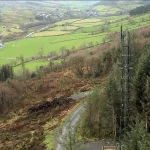B4RN Celebrate After Raising £3m for Rural Gigabit FTTH Rollout
Rural focused UK ISP B4RN (Broadband for the Rural North) has successfully hit their £3 million crowdfunding target via Triodos Bank (here), which will help to support the on-going rollout of a community built and funded 1Gbps Fibre-to-the-Home (FTTH) broadband network across remote parts of several counties.
As a community benefit society (i.e. B4RN can’t be bought by a commercial operator and any profits are distributed back into the community) they have so far deployed over 3,000km of fibre optic cable across rural parts of Lancashire, Cheshire, Cumbria, Essex, Norfolk, Suffolk and Yorkshire. Overall B4RN has connected around 6,000 homes (live customers) and the new funding may enable them to reach 20,000 over the next few years.
In keeping with this the operator has been busy making good use of the Government’s £67m business connectivity orientated Gigabit Broadband Voucher Scheme (GBVS) and its new residential focused £200m Rural Gigabit Connectivity (RGC) programme, although this has required them to quickly ramp-up their operations (i.e. if they don’t then the schemes could expire before they’re able to complete all of the planned work).
Advertisement
The challenge in all of this is that building “full fibre” networks remains an inherently slow process, particularly when dealing with community efforts and organising volunteers. Meanwhile many of their builds require the vouchers to be aggregated and that means B4RN has to get lots of Aggregated Pre Registered Packages (APRP) approved, usually before they can start encouraging local people to sign-up for vouchers (this takes a long time).
Sadly the vouchers only get paid AFTER the property is connected and live, which of course leaves B4RN to fund the build cost until that stage is completed and this is where the crowdfunding raise will be able to do the most good (i.e. giving them enough funding to get moving without having to wait around for the admin side).
“We are in a different world to the one we used to inhabit, it’s no longer a question of money but instead it’s about delivery,” said Barry to ISPreview.co.uk during May 2019 (here). The £3m announcement was actually made last week (here) but for some reason B4RN didn’t let us know, although credits to Thinkbroadband for spotting it.
The funding drive remains open and there’s a possible maximum capital raise of £5 million. It will be interesting to see how close B4RN can get to that figure. If we had any advice for B4RN (not that they need it), we would recommend raising their 1Gbps monthly rental a little from £30 as that could otherwise start to act as drag on their financial model.
Advertisement
Mark is a professional technology writer, IT consultant and computer engineer from Dorset (England), he also founded ISPreview in 1999 and enjoys analysing the latest telecoms and broadband developments. Find me on X (Twitter), Mastodon, Facebook, BlueSky, Threads.net and Linkedin.
« Ofcom Toughens UK Phone Number Porting to Prevent Abuse

















































Comments are closed